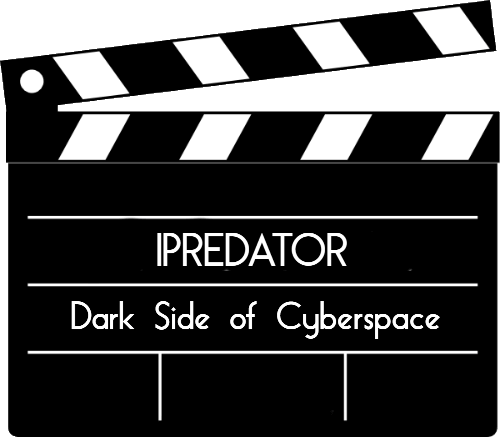iPredator Media Project Ideas

Given that we live at the beginning of the Information Age, it is critical for all of us to think about what that means in relationship to our safety and sanity. Presented here are iPredator educational media project ideas for online and offline broadcasts. Not being media production savvy or blessed with writing talents, I can elaborate best by phone or in person if interested. Although I would hope a production company or professional would include me in the creation of their project, my participation is unnecessary. The goal is to enlighten people about the dark side of cyberspace via entertainment.
Dark Side of Cyberspace
Dark Side of Cyberspace is a metaphor and conceptual framework defining a virtual realm that includes all criminal, deviant, deceptive, harmful, and malevolent activities in the abstract universe of cyberspace. Whereas iPredator is a criminal, deviant and disturbed typology concept, the Dark Side of Cyberspace also includes legal and illegal online activities, as well as destructive and self-destructive online behaviors. A media project would be centered upon this environment
Whatever the media venue format; knowledge, awareness and entertainment remain the goals. There have been few notable documentaries, podcasts or news shows that have addressed the psychology of the online abuser & victim. Concisely, inside criminal minds have become inside cybercriminal minds.
Whether we like it or not, internet safety and cybercrime prevention will be serious issues for generations to come. In addition to safety issues, virtual reality and artificial intelligence will become more influential as the information age evolves. It is my belief we as an intelligent society need to trigger a cultural technocentric revolution.
Consumers love shows and productions involving crime and the dark side of the human condition. They will equally be fascinated by cybercrime, online aggressors, and the information age dark side of human consciousness. Whether the production is rooted in fiction or non-fiction, consumers would be captured.
For those of you who are reading this content, it is reasonable to assume that you spend most of your waking life online. Whether for work, school or pleasure, we live out our lives in front of a digital device. For children of the information age, their time spent online, and the psychological impact are indeed greater. As of early 2022, I know of no production that presents the intrapersonal & interpersonal aspects of online aggression, deception and victimization. Presented here are five show ideas that can be produced in visual and/or audio formats.
Media Ideas

Media Idea I (Long Form News Show, Podcast, Documentary or Docuseries)
My ideas and titles for a documentary, docuseries, podcast, current news coverage or show are as follows:
- iPredator: The Dark Side of Cyberspace
- iPredator: Cyberbullying, Cyberstalking, Cybercriminal Minds
Eight iPredator Types
- Cyberbullies
- Cyberstalkers
- Cyber Harassers
- Internet Trolls
- Cybercriminals
- Cyberterrorist
- Online Sexual Predators
- Online Child Pornography Consumers
Additional Topics of Interest
- Predatory Trolls
- Online Psychopaths
- ODDOR
- Troll Triad
- Online Deception (aka, Cyberstealth)
- Internet Addiction
- Cyberbullicide
- Information Age Parenting
- Dangers of Online Dating
- Dark Side of Cyberspace
- Cyber-Attack Prevention
- Older Adult Online Safety
- Sextortion
Within each iPredator typology, there are many subtopics for shows and/or segments. Preferably, but not necessarily, the show would be anchored by a psychologist and either an investigative journalist, law enforcement professional, private detective or host familiar with information age issues and human behavior. The importance of a psychologist as a cohost or included as a guest expert is to present psychological analysis.
Whatever the topic, a segment would be dedicated to talking to the aggressor and victim(s). Additionally, included in every topic production would be brief interviews with experts and notable professionals ranging from academics to top public figures. Dark Psychology themed and true crime enthusiasts are riveted by attacker interviews and the psychology of the aggressor and/or victim(s).
It is now time to produce a show or a series that addresses the dark side of cyberspace. Cyberspace is best defined as an abstract artificial digital universe. Although the digital universe is artificial, humans are increasingly perceiving it as a legitimate place. With each passing year, society will become dependent upon information technology. Therefore, cyberpsychology will become extremely important. It is not as important as what technology people are using, but why and how they are using it.
Media Idea II (Face-to-Face Interviews)
Based on the remarkably successful interview show “Closer to Truth,” it would be a series dedicated to interviewing philosophers, social sciences experts, law enforcement professionals and the like. The theme would be involving the topics listed above.
Media Idea III (Travel & Cyberpsychology Themed)
Part travel, part educational; a show(s) that involves a psychologist and co-host that travels to different countries and regions to interview and investigate how diverse cultures deal with the dark side of cyberspace.
Media Idea IV (Fictional)
A movie or show(s) that is centered around my dark side of cyberspace parable titled “I am iPredator.” This parable is a letter from Lucifer thanking humanity for opening a portal for his return. The portal being the mass deceptions within cyberspace.
Media Idea V (Pediatric Themed)
A limited series or show titled “Cyber Tyger”. Cyber Tyger is an internet safety superhero for young children. As soon as children can walk, they are now introduced to information technology & digital devices. Cyber Tyger battles the internet troll villain “Trollum” in cyberspace. He teaches young children about cyberbullying prevention, online stranger danger and how to conduct oneself online.

iPredator Definition
iPredator: iPredator is a person, group, or nation who, directly or indirectly, engages in exploitation, victimization, coercion, stalking, theft, or disparagement of others using Information and Communications Technology (ICT). iPredators are driven by deviant fantasies, desires for power, control, and retribution, religious fanaticism, political reprisal, psychiatric illness, perceptual distortions, peer acceptance, or personal and financial gain. They can be any age or gender and are not bound by economic status, race, religion, or national heritage. Their sole requirement to get started in this dark dimension is an internet connection.
Central to the concept is the premise that information age criminals, deviants, and the violently disturbed are psychopathological classifications new to humanity. Whether the offender is a cyberbully, cyberstalker, cyber harasser, cybercriminal, online sexual predator, cyberterrorist, internet troll, online child pornography consumer/distributor, or a person engaged in internet defamation or nefarious online deception, they fall within the scope of iPredator. The three criteria used to define an iPredator include:
- A self-awareness of causing harm to others, directly or indirectly, using ICT.
- The usage of ICT to obtain, tamper with, exchange and deliver harmful information.
- A general understanding of cyberstealth used to engage in criminal or deviant activities or to profile, locate, stalk, and engage a target.
Unlike human predators prior to the information age, iPredators rely on the multitude of benefits offered by ICT. The primary differentiators of this very modern kind of predation are also threefold: the unlimited distance over which data can be conveyed, the immediacy with which the data can be conveyed, and the unlimited scope of data that can be conveyed. The importance of these three vectors of capability cannot be overstated.
In pre-information age societies, by contrast, a predator’s malicious activity was local, slow-moving, and technologically constrained; the predator was limited to the area he could cover by car, to use an emblematic example, needed careful wooing or “casing” of his victim, and was restricted by the limitations of crude technologies like the telephone.
In the abstract and artificial electronic universe known as cyberspace, none of these restrictive qualifiers obtain. Furthermore, there is a fourth advantage that ICT offers iPredators: anonymity. On the internet it is easy for iPredators to actively design online profiles and diversionary tactics to remain undetected and untraceable.
“Cyberspace can be a classroom, insane asylum, dance floor or lethal weapon. It’s your choice what metaphor you choose.” Michael Nuccitelli, Psy.D.
Since authoring iPredator in 2009, I have researched online aggression and online victimization. I have also volunteered after work and on the weekends helping the cyber-attacked. Many of the online users I’ve tried to help voiced a wish for some type of media venue to help them learn about cyber-attack prevention and online assailants (aka, iPredators).
It is time for a news show, podcast, docuseries or movie to be produced that introduces people to the many types of iPredator. Not only the cybercriminal mind but the ways iPredators victimize online users. The potential topics are endless and would be embraced by citizens of the information age.

Michael Nuccitelli, Psy.D.
Michael Nuccitelli, Psy.D. is a NYS licensed psychologist, cyberpsychology researcher and online safety educator. In 2009, Dr. Nuccitelli finalized his dark side of cyberspace concept called iPredator. Since 2010, he has advised those seeking information about cyberbullying, cyberstalking, cybercriminal minds, internet addiction and his Dark Psychology concept.
By day Dr. Nuccitelli is a practicing psychologist, clinical supervisor and owner of MN Psychological Services, PLLC. After work and on the weekends, he volunteers helping online users who have been cyber-attacked. Dr. Nuccitelli’s is always available to interested parties and the media at no cost. This website and everything created by Dr. Nuccitelli is educational, free and public domain.
“Cyberspace is an Extension of Human Consciousness.” Michael Nuccitelli, Psy.D.
